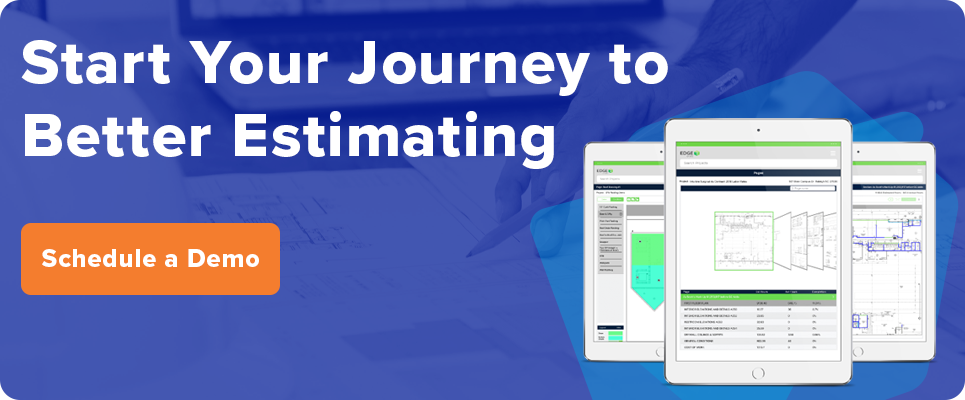
Any contractor who has used or shopped around for takeoff and estimating software has probably seen the phrase “trade-specific databases” pop up at some point. Trade-specific databases are built-in systems filled with items and assemblies that can be input into estimates as they’re being built. They’re customized to specific construction trades and often pre-loaded into estimating software to help streamline the bidding process. Trade-specific databases contain the trade-specific information that is needed to complete a bid.

These databases provide a number of benefits to the contractors who operate within specialized trades like roofing, drywall, EIFS and more. They help to streamline and speed up the estimating process, enhance accuracy and can even help optimize resource use.
Let’s look at why trade-specific databases are crucial for effective estimating:
Why Are Trade-Specific Databases Important, In General?
- Efficiency and Customization: Contractors often adopt trade-specific databases because of the time these resources can save them.
- If a company opts to use a generic estimating program that does not come pre-loaded with trade-specific databases, they’ll spend a great amount of time working to automate the items and assemblies that fit the needs of their trade.
- Streamlined Onboarding Process: When first implemented, most estimating software will come with a basic database. Trade-specific databases are more expansive and tailored to the contractor’s trade. Because preloaded databases save contractors from needing to input the builds and assemblies manually, they’ll help to save time upfront.
- Some estimating software might also come with additional databases for other trades that can be easily synced to the system
- Easily Adaptable: Another advantage of trade-specific databases is how easy they are to adapt to a company’s existing workflow. These databases are designed to seamlessly integrate with existing systems and processes, minimizing disruptions and providing a smooth transition for teams.
- Accurate and Relevant Data: Trade-specific databases provide contractors with precise and relevant data tailored to the specific needs of their field.
- Unlike generic estimating software, which may offer generalized estimates, software with trade-specific databases can offer detailed insights into material costs, labor requirements and popular suppliers, enabling businesses to generate more accurate estimates in shorter periods of time.
- Industry-Specific Parameters: Estimating software that is tailored to a particular trade will only ask questions specific to that industry, rather than relying on generic templates.
- For example, if a drywall contractor is using an estimating system with trade-specific databases, the software will not only estimate the cost of drywall boards but will also inquire about drywall anchors, drywall screws, different joint compounds plus other necessary materials.
- This prevents contractors from needing to sift through tasks and checkboxes that are irrelevant and have no bearing on their estimates.
- Enhanced Support and Training: Trade-specific estimating software will often come with access to specialized support and training resources geared toward the needs of those in the industry.
- This ensures that users receive targeted assistance and guidance from experts who understand the nuances of their trade, rather than generic support that may not even be relevant.
- For example, if a drywall contractor is using an estimating system with trade-specific databases, the software will not only estimate the cost of drywall boards but will also inquire about drywall anchors, drywall screws, different joint compounds plus other necessary materials.
Trade-specific databases play a crucial role in optimizing the estimating process for specialty contractors. Embracing trade-specific estimating software is not just about purchasing a new tool, it’s about investing in efficiency and accuracy that can help carry you to the top of your trade.
Why Are Trade Databases Important to Contractors Specifically?
Trade-specific databases play a crucial role in enhancing efficiency within specialized industries. They also help create:
- Precision and Accuracy: Trade-specific databases provide detailed, industry-specific data that is tailored to the unique requirements of specific trades. By leveraging accurate and reliable data, businesses can generate more precise estimates, minimize cost overruns and improve project profitability.
- Accurate estimates can also help to increase customer retention as well as a company’s reputation.
- Competitive Advantage: Comprehensive trade databases can give businesses a competitive edge by empowering them to respond quickly to market changes or shifts in industry standards and create estimates in a flash.By staying agile, businesses can draw a clear line between themselves and the competition.
- Risk Mitigation: Trade databases help businesses identify and mitigate potential risks associated with project execution and resource allocation. Contractors can use the resources within trade-specific databases to proactively address challenges and minimize issues before they occur.
- Efficiency: By automating repetitive tasks and standardizing estimating habits, businesses can use trade-specific databases to save time, reduce administrative overhead and focus on providing quality service to their customers.
How to Use Trade-Specific Databases in A Construction Estimate
Imagine you’re a roofer tasked with estimating the cost of a parking garage’s roof. With a roof-specific database, the process becomes significantly easier.
Let’s walk through how you might use a roofing-specific database on the jobsite:
- Material Selection: An estimator with a trade-specific database would begin an estimate by sorting through the database’s catalog of roofing materials. The estimator would have access to various types of shingles, underlayments, flashings and sealants.
- In this stage, the estimator can quickly select the materials that are ideal for completing the project.
- Customization: Next, the estimator will edit the specs of the chosen materials to fit the requirements of the project. This step requires the estimator to do things like select the correct size and color of shingles and specify the thickness and type of underlayment.
- In doing this, the database allows the estimator to customize every detail to the job at hand.
- Quantity Calculation: Once the materials are selected and customized, the database automatically calculates the quantities needed based on the project’s dimensions, layout and other relevant factors.
- This eliminates guesswork and manual calculation to help ensure the correct amount of materials are ordered, helping to avoid costly overages or shortages.
- Labor Cost: In addition to material costs, the database will help to provide estimates for labor expenses based on industry-standard rates and other metrics. Factors like installation time, crew size and specialized skillsets required are taken into account, allowing estimators to accurately budget for labor costs.
- Estimate Generation: Once all the necessary data has been input, the attached estimating software will generate a detailed estimate that breaks down the costs of materials, labor, equipment, overhead and profit margin. This estimate can then be shared with clients or stakeholders.
With the power of a trade-specific database, estimators can streamline the estimating process, improve the accuracy of the final bid and ultimately deliver exceptional results for their projects. From material selection to labor cost estimation and beyond, the database is a valuable tool that empowers roofers to efficiently manage projects and exceed client expectations.
Improving Your Estimating With The EDGE®
Trade-specific databases are indispensable tools for contractors. These databases provide tailored, industry-specific data that streamlines the estimating process, enhances accuracy and optimizes resource utilization. By offering precise information on material costs, labor requirements and project details, trade-specific databases empower contractors to generate more accurate estimates in less time, ultimately leading to improved project profitability, customer satisfaction and competitive advantage.
Embracing trade-specific estimating software isn’t just about staying hip to the latest trends, but about investing in efficiency and accuracy. Contractors searching for estimating software with built-in trade-specific databases should consider The EDGE.

The EDGE offers trade-specific databases for estimators in the drywall, EIFS, fireproofing, flooring, painting, roofing, wall panel and waterproofing trades and has the most all-inclusive list of manufacturer-specific components.
Click the button in the upper corner to schedule a demo today and learn how The EDGE can help you on your journey to becoming a more effective estimator.





